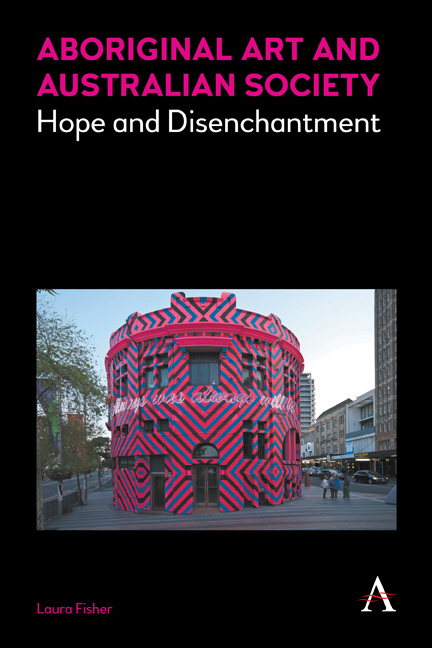Book contents
- Frontmatter
- Dedication
- Contents
- Preface and Acknowledgements
- Introduction
- Part I Governance, Nationhood and Civil Society
- Part II Contemporary Aboriginal Art in the 1980s
- Part III Negotiating Difference
- Chapter 7 Negotiating Aboriginal Difference
- Chapter 8 The Art/Anthropology Binary
- Part IV Aboriginal Art, Money and the Market
- Conclusion
- Notes
- References
- Index
Chapter 7 - Negotiating Aboriginal Difference
from Part III - Negotiating Difference
Published online by Cambridge University Press: 22 July 2017
- Frontmatter
- Dedication
- Contents
- Preface and Acknowledgements
- Introduction
- Part I Governance, Nationhood and Civil Society
- Part II Contemporary Aboriginal Art in the 1980s
- Part III Negotiating Difference
- Chapter 7 Negotiating Aboriginal Difference
- Chapter 8 The Art/Anthropology Binary
- Part IV Aboriginal Art, Money and the Market
- Conclusion
- Notes
- References
- Index
Summary
Four Facets of Difference
Aboriginal difference is perceived and problematised in several ways in the art arena. First, Aboriginality exists as a site of disadvantage and injustice. This means that a range of parties advocate on its behalf on the basis of principles of equality and fairness, inclusion where there was once exclusion and respect where there was once stigma. As discussed earlier, Aboriginal art's subsidy and endorsement has been driven by the conviction that the restoration of Aboriginal culture is a matter of human rights and a means to alleviate disadvantage, and ethical concerns of this nature mediated many engagements between non-Indigenous practitioners and Aboriginal art in the 1980s. These issues are salient to the collecting practices of institutions, the opportunities available to Aboriginal artists and art professionals and the degree to which Aboriginal art gains acceptance in eminent contemporary art settings.
Second, Aboriginality is a site of exotic difference. Here we encounter all the ideas that underpin the objectification and commodification of otherness, which have revolved around notions of the premodern, the pre-industrial, the primitive, the tribal, the folkloric and so on. All of these currents of thought have been reference points for artistic and scholarly formulations of modernity (Enwezor 2003; Marcus and Myers, 1995; Clifford 1988). The sociologist Dean MacCannell offers some useful insights on this aspect of modernity in his seminal work The Tourist (1976), in which he argues that touristic experiences actualise the social differentiations that structure modern society. He argues that tourism produces a form of ‘modern solidarity’ (78) by packaging, in the service of the sightseer, aspects of nature, place, history and culture that signify what modernity is not. As he writes:
The progress of modernity (‘modernisation’) depends on its very sense of instability and inauthenticity. For moderns, reality and authenticity are thought to be elsewhere: in other historical periods and other cultures, in purer, simpler lifestyles. In other words, the concern of moderns for ‘naturalness’, their nostalgia and their search for authenticity are not merely casual and somewhat decadent, though harmless, attachments to the souvenirs of destroyed cultures and dead epochs. They are also components of the conquering spirit of modernity – the grounds of its unifying consciousness. (3)
- Type
- Chapter
- Information
- Aboriginal Art and Australian SocietyHope and Disenchantment, pp. 105 - 116Publisher: Anthem PressPrint publication year: 2016



